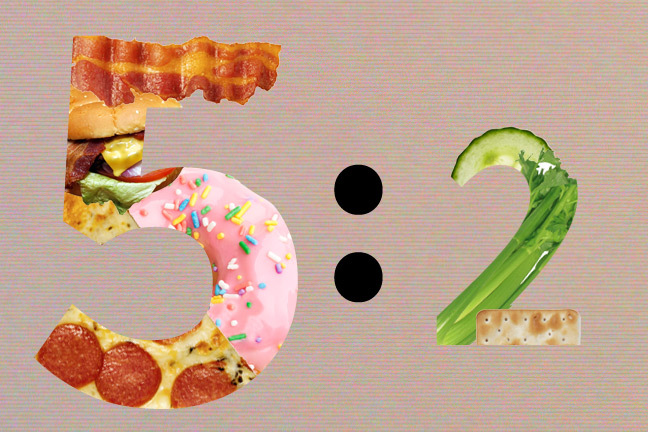5:2 Diet

It’s the weight-loss conundrum: The more we focus on how much food we’re putting into our mouths, it seems the more likely we are to fail. “If you worry about being super-healthy all the time, it’s quite challenging,” says British medical journalist Michael Mosley, M.D., who is—not coincidentally—the co-author of England’s newest and hottest bestselling diet book, “The FastDiet: Lose Weight, Stay Healthy, and Live Longer with the Simple Secret of Intermittent Fasting.” “That’s why standard dieting doesn’t work.”A lifelong diet agnostic, Dr. Mosley—54 and overweight at the time—knew he needed to do something when, last year, his doctor told him his blood sugar and cholesterol levels were dangerously high. His solution: Devise a slim-down plan that allowed him to eat whatever he wanted five days a week. The catch? Well, if there’s one thing we know about dieting, there’s always a catch.MORE: Healthy Eating for Better Blood PressureThe Diet PlanAlso known as the 5:2 diet, “The FastDiet” is not a reference to how quickly the weight falls off, but to the type of eating plan you follow: intermittent fasting. Two days per week, women “fast” by eating no more than 500 calories a day, while men get 600 calories per day. Although this may seem rather unpleasant, the tradeoff is that you get to eat whatever you want on those other five days. No calorie-counting and no off-limit foods.The Health ClaimsMore than just a weight loss plan, the book suggests that the 5:2 diet will also radically alter one’s health. The first half of “The FastDiet” details the emerging research (done mostly on rodents) on intermittent fasting. Among its purported benefits, fasting lowers insulin, switches the body from fat storing to fat burning mode, improves cholesterol, boosts mood and cognitive function, slows down aging and decreases the risk of cancer and other diseases. All this—and speedy weight loss to boot. According to Mosley, these mini timeouts from food trick the body into thinking there’s a famine. And when that happens, he says, the body goes into repair mode.The CriticsThe problem, says Krista Varady, Ph.D., assistant professor of nutrition at the University of Illinois at Chicago, one of the few scientists to have examined intermittent fasting in humans and whose work is prominently featured in the book, is that Mosley’s 5:2 diet bears little resemblance to the intermittent fasts that have actually been studied. For instance, whereas his diet is five days off and two days on, Varady’s research involves every-other-day (or alternate-day) fasting. To say that his diet will have the same health and weight loss results as the ones in the controlled studies is, “very scientifically inaccurate,” says Varady.MORE: Can Certain Foods Speed Up Weight Loss?According to Joan Salge Blake, R.D., clinical associate professor at Boston University and media spokesperson for the Academy of Nutrition and Dietetics, many of the miraculous-seeming health benefits of fasting occur with any kind of weight loss. “When you lose weight, it lowers blood pressure and it lowers LDL [bad] cholesterol,” explains Blake. Cancer is also associated with obesity, she points out, so when you drop pounds, your risk for that—and other inflammatory diseases—also plummets.Put simply, it’s hard to say whether these radical health benefits are the result of fasting or simply losing weight, explains Amy Jamieson-Petonic, a registered dietitian and the director of wellness coaching at the Cleveland Clinic Wellness Institute.Though Mosley does stand by the 5:2 diet as a tool for weight loss, he admits that it may not be the key to longevity that the book suggests. “Whether you will get the same benefits if you don’t need to lose weight is much less clear,” he points out. “I wouldn’t go out on a limb and say that this is going to make you live forever. I think this is primarily for people who are overweight.”Will I Lose Weight?If losing weight is your main motive for trying this diet, any type of eating plan that cuts calories—whether over two days or seven—is going to help you shed pounds, observes Blake. “The allure of this diet is that people don’t really have to think about what they eat five days a week,” she says. If you can get through those two tough days of famine, you’ve got five days of feasting to look forward to.MORE: The Mediterranean Diet—Best Diet Ever?However, this selling point of Mosley’s diet is also something of a sticking point. To keep the advice simple in his book, Mosley advises people to just “eat normally” when not fasting. Of course, one person’s usual fare could be cheese Danishes and double cheeseburgers, while another enjoys salmon and kale. When I point this out during our interview, Mosley stresses that one must in fact make healthy choices in order for the diet to work. “I think if you eat junk food, that will undo many of the benefits,” he says. “It doesn’t mean that you don’t ever [eat junk], but it’s not an invitation to do so.”Though Varady’s research on every-other-day fasting has shown that people only eat about 110 to 115 percent more on their “off” days, she cautions that this might not be the case in Mosley’s version. Eating whatever you want five days out of seven can quickly add up to more calories than you cut out during two fasting days—especially, she says, in obese people (whose eating habits are usually less than ideal).The TakeawayThough it may be extreme, “The Fast Diet” helps take the guesswork out of dieting. If you would rather tolerate hunger pangs on two days so that you can eat normally for the other five, this may just be your diet. But if the weight isn’t coming off in the way that you had hoped, chances are, your diet on your off days is still in need of a healthy overhaul.”Food is not ‘Let’s Make a Deal,’ ” says Michael Roizen, M.D., co-founder of YouBeauty and the chief wellness officer at the Cleveland Clinic. “Eating for health is consonant with losing weight and keeping it off. This diet could be that way, depending on your choices on the five days, but it doesn’t promote health and may not promote sustained weight loss.”According to Jamieson-Petonic, many people are good at losing weight, but 95 percent of people who lose weight gain it back. So far, there have been no long-term studies that prove intermittent fasting can keep the weight off for good.QUIZ: Are You an Emotional Eater?
- Prev:Psychology of Weight Loss
- Next:Sleep and Exercise
-
Dining out increases calorie intake
-
Exercise tips for weight loss: Don’t be afraid! Intro to the weights section
-
6 Quick tips to whip your tummy into shape
-
Top 9 Celebrity Weight Loss Secrets Revealed
So you failed! Losing weight is no walk in the park, is it? Feeling di
-
Sculpt your body for summer
-
Lose weight by eating fruit
- DON'T MISS
- Q&A: Why Is It SO HARD to Lose the Last 5 Pounds?
- Are you obsessed with food and diet?
- Do women gain more stomach fat than men?
- Proven: 7 Best WEIGHT LOSS tips that actually work
- Menopause cause of spare tyre but not weight gain
- Fight weight gain with a vibrating fork
- Papaya Diet – How Helpful Is It?
- 10 Reasons Why Cycling/Biking Is Good For You?
- Should I get a weight loss partner?
- Top habits of successful dieters: Do THIS for long-term weight loss




